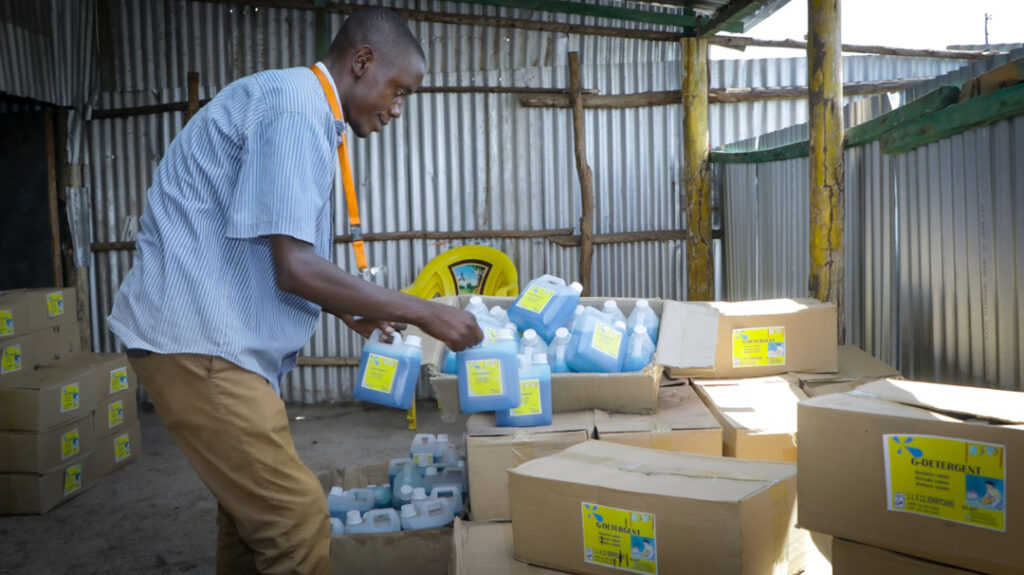ADF STAFF
Everyone needs soap.
For Innocent Havyarimana, who built a soap business in a Kenyan refugee camp, it’s more of a mantra than a motto.
His business is about providing a basic need for those in the camp and the host community. Sanitation is vitally important in refugee camps to prevent disease outbreaks. The threat of COVID-19 made soap even more essential.
“When I reached the camp in 2013, I found the life very difficult,” he told ADF. “I started to imagine how I am going to live here. I decided to start a business that is not here in the camp. I found that soaps are coming from outside the camp.
“I started with only two types of soap and two paid staff members. Now we are making 14 types of soap, and I have 42 employees — 18 are from the host community and 24 are from the refugee and settlement camps.”
Havyarimana fled Burundi in 2013 at age 29. After his mother died, some of her relatives took his home and threatened his life. He was forced to abandon his chemistry studies at the University of Burundi.
After settling in the refugee camp in Kakuma, Kenya, he asked the Lutheran World Federation’s humanitarian branch to take him to a 10-day soap-making training. He then got a startup loan of $9.04 (1,000 Kenyan shillings, or KES) from a friend and former schoolmate in Burundi to buy chemicals and make his first batch of soap.
When demand increased, Havyarimana took a $453.72 loan (50,000 KES) from a nongovernmental organization (NGO) called Action Africa Help International. He repaid it in six months.
He also has received grants from the United Nations Refugee Agency (UNHCR) and from the African Entrepreneur Collective NGO.
Now 37 and married with two young sons, Havyarimana is the founder and CEO of GLAP Industries — an acronym for God Loves All People. GLAP supplies people, businesses, schools and relief agencies with soap and other cleaning products.
While waiting to be resettled with the help of the UNHCR, he operates his business and teaches other refugees in Kakuma how to make soap.
“I know I am making more competitors for my business,” he said, “but the Bible teaches, ‘Give what you have, and God will bless you with more than what you think.’”
Havyarimana is just one example of the community spirit at Kakuma, said Kahin Ismail, UNHCR senior operations manager for the camp.
“Refugees are playing an important role in prevention” of COVID-19, he said on the organization’s website. “In Kakuma, there are so many people doing something in the fight against COVID-19, whether it is mask-making or spreading awareness.”
Havyarimana’s soap brings hygiene and awareness to Kakuma. It brings him joy and satisfaction to take care of others.
“During this COVID-19 period, I have decided to reduce prices, to pack the soap in small containers where even a person with low income can afford to buy soap and prevent coronavirus,” he said. “Sometimes I give free soap to the community and to public areas.
“We have many vulnerable refugees, people with disabilities and very old people, who are not able to buy the best protection for COVID-19.”
Established in 1992 in northwestern Kenya, Kakuma is one of the world’s largest refugee camps, hosting 196,666 people. There were 341 confirmed cases and 10 deaths in the camp as of December 24, 2020, according to the UNHCR.
Since the virus struck, GLAP has increased production by 75%.
But Havyarimana says his business is not about money — it’s about serving. Because everyone needs soap.
“It means a lot,” he said. “It is what I always tell my African community: Let us hold each other, and if someone has a good idea, support him so that he can go far, because this will assist not him alone but the whole community, the whole country, even the whole world.”

